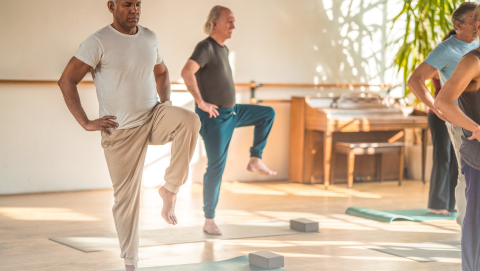Mind Over Matter: The Benefits of Mindfulness for Senior Adults
By: Christina Pay, Extension Assistant Professor

Mark Twain is attributed as saying, “Age is an issue of mind over matter. If you don’t mind, it doesn’t matter.” As we age, maintaining mental and physical health becomes increasingly important and certainly does matter. One effective approach to achieving this is through mindfulness. Mindfulness, the practice of focusing on the present moment without judgment. “Mindful aging is accepting and embracing changes that are an inevitable part of growing older. It means not denying that there are negative aspects of growing older, but also recognizing and focusing on the positive aspects of aging, of which there are many. When we age mindfully, we make the most of every day we’re alive and appreciate that we won’t’ be around forever.” (Brandt, 2017).
Mindfulness can offer numerous benefits for senior adults. Here are some key advantages:
- Reduces Stress and Anxiety. Mindfulness helps in managing stress and anxiety, which are common issues among seniors. By promoting a calm and focused mind, mindfulness practices such as meditation and deep breathing exercises can reduce the production of stress hormones like cortisol. This leads to a more relaxed state and improved emotional well-being
- Enhances Cognitive Function. Aging often brings cognitive challenges, but mindfulness can help maintain and even improve brain health. Studies have shown that regular mindfulness practice enhances memory, attention, and executive function. It encourages neuroplasticity, the brain's ability to form new neural connections, which is vital for keeping the mind sharp.
- Improves Physical Health. Mindfulness has positive effects on physical health by promoting better sleep, reducing chronic pain, and lowering blood pressure. Mindful movement practices like yoga or tai chi can improve balance and flexibility, reducing the risk of falls and improving overall physical stability.
- Boosts Emotional Well-being. Mindfulness encourages a positive outlook by helping individuals focus on the present and appreciate life’s simple pleasures. This can reduce symptoms of depression and foster a sense of contentment and gratitude, contributing to overall happiness.
- Enhances Social Connections. Engaging in mindfulness activities often involves group settings, which can help seniors build social connections. These interactions provide emotional support and reduce feelings of loneliness and isolation, which are critical factors for mental health in older adults.
Tips for Practicing Mindfulness
- Start Small: Begin with short sessions of 5-10 minutes and gradually increase the duration as you become more comfortable with the practice.
- Focus on Breathing: Pay attention to your breath. Inhale deeply and exhale slowly, which helps center your mind and reduce stress.
- Practice Mindful Eating: Take the time to savor your food, paying attention to the taste, texture, and smell. This can turn a routine meal into a mindful practice.
- Incorporate Gentle Movement: Activities like walking, yoga, or tai chi can be practiced mindfully by focusing on each movement and how your body feels.
- Join a Group: Consider joining a mindfulness or meditation group for seniors. This provides structure and support, making it easier to stick with the practice.
Incorporating mindfulness into daily life can significantly enhance the quality of life for senior adults, promoting a healthy mind and body. Whether through meditation, mindful movement, or simply paying more attention to the present moment, the benefits are profound and far-reaching.
Additional Resources:
- Meditation for Older Adults
- 10 Mindfulness Activities for Seniors
- Is Tai Chi for Me?
- Practicing Mindfulness
- Mindful Eating: Benefits, Challenges, and Strategies
References:
Brandt, A. (2017). Mindful aging. PESI Publishing & Media.
Geiger, P.J., Boggero, I.A., Brake, C.A. et al. Mindfulness-Based Interventions for Older Adults: a Review of the Effects on Physical and Emotional Well-Being. Mindfulness 7, 296–307 (2016). https://doi.org/10.1007/s12671-015-0444-1
Fountain-Zaragoza, S., & Prakash, R. S. (2017). Mindfulness: Training for healthy aging: Impact on attention, well-being, and inflammation. Frontiers in Aging Neuroscience, 9(11). https:// 10.3389/fnagi.2017.00011
Kennedy, Q. (2022, December 15). Aging and mindfulness. Psychology Today. https://www.psychologytoday.com/us/blog/aging-and-mindfulness/202212/aging-and-mindfulness

